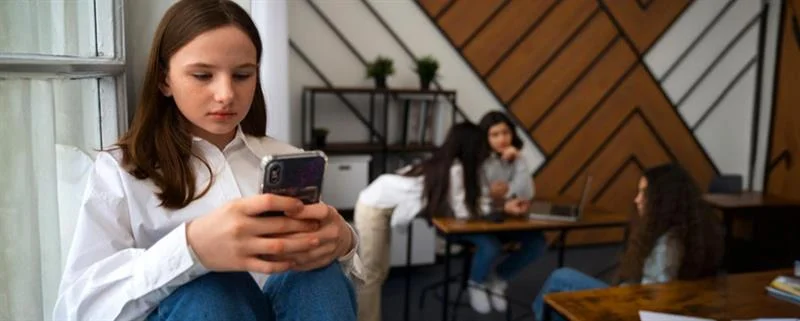Social media is not just part of our lives now, but it is essentially part of us. We are so fond of it that our mornings don’t start without having a look at social updates from our favourite social media handle. If we are so ingrained in social media, it is likely our mental health is also affected by it and that we, ladies and gentlemen, are about to entangle: the link between social media and mental health. In the words below, we are just going to do that, but we’ll do it while keeping in mind the impact of social media on mental health.
Let’s discuss how social media affects mental health.
Social media is a double-edged sword as it is good for creating awareness for a lot of things and gives a voice to the voiceless, but it is also designed to reinforce its use. This use frequently converts into overuse, and that overuse is precisely one of the many negative things that are attached to it. But this is just the tip of the iceberg that is social media, as you will get a better idea by looking over the pros and cons of social media in the context of mental health. The cons will specifically highlight the dangerous link between social media and mental health:
Read More: Can Dehydration Cause Anxiety? Understanding The Connection Between Water And Mental Health
The Pros
- As mentioned before, it gives a voice to the voiceless
- An outlet for self-expression and creativity
- Makes our communication with loved ones and friends better
- Allows us to make our network bigger by creating new opportunities for it
- It is great as a telehealth psychiatry alternative as therapy through it can be available to anyone, anywhere, and anytime.
- It also helps in seeking and creating emotional support
- It is also a conduit for finding social and professional connections, which might help in situations where you live in a remote area or perhaps belong to a marginalized group.
- A source of valuable knowledge and educational information
The Cons
Multiple sources have found a strong link between negative effects such as self-harm, depression, an increased risk of anxiety, loneliness, suicidal ideation, high usage of social media, and people with disorders such as OCD are also affected (Guazzini et al., 2022). When you read the following words, you will essentially understand social media and mental health’s dangerous link. Let’s see what these are:
Induces Body Dysmorphia and Unfair Comparisons of Life
One of the worst yet highly undetected negative experiences that is associated with social media is body dysmorphia. People tend to make comparisons when ample profiles are available that practice impression management of the extreme kind, which include elevated yet almost unattainable standards of beauty (most of the time associated with celebrities or beauty influencers). These profiles produce feelings of inadequacy among the followers of these profiles about their own bodies due to the aforementioned reasons.
Read More: Mental Health Continuum
Unfair comparisons of life abound in social media handles as much of the images found in it are manipulated, and social media users might not know that. Once again impression management is done here to show a life that wonderful and good looking to all on your follower list who might not know what is happening in the background, which may lead them to compared their life, which might seem problematic to them when compared to the profiles of the people who may have a seemingly sanitized and unaffected life.

Addiction to Social Media
As a social media user, you often feel you might miss out on something, especially when all of your peers are on a particular social media handle. This leads to fear of missing out (FOMO) as many who use the same social media handles as their friend circle or family start stressing about whether they are going to miss out. This often blurs the line between social media and mental health as it triggers anxiety and induces stress as a result of the addiction to updates that one gets used to when using social media. It also has a tendency to affect the user’s self-esteem, and that too excessively, which is often the result of their addiction to social media and also the points discussed above combined. All of these behaviors reinforce the addiction to social media, and mental health is affected as a result.
Anxiety and Depression
Actual human contact is a necessary part of life. We can see our depression and anxiety drown the moment we see a human being. This is why COVID-19 was hellish to deal with because human contact had become a hazard for the pandemic. The more you are likely to prioritize social media interaction over face-to-face interaction, the more you’re at risk for developing or exacerbating mood disorders such as bipolar disorder or anxiety and depression. Read More:Depression Symbol Tattoos To Support Mental Health
Narcissism
Feeling pride in yourself is not such a bad thing, but always being self-absorbed is. Narcissism is another indicator that your addiction to social media is overblown and mental health is about to suffer as sharing endless selfies and all your innermost thoughts on social media can create an unhealthy self-centeredness and distance you from real-life connections, often contributing to narcissistic personality (where individuals are extremely self-obsessed and overestimate everything related to them).
Cyberbullying
Social media has become a breeding ground for cyberbullies even though a lot of work has been done by the community managers of respective social media handles, but still many manage to get away. This is because about 10 percent of teens report being bullied on social media, and many other users are subjected to offensive comments, especially on social media platforms that provide anonymity. Read More:What is Depression ?
Treatment
The dangerous link between mental health and social media can be eliminated by seeking treatment and making lifestyle changes.

Psychotherapy
Any type of mental health problem is treatable by psychotherapy (talk therapy). For example, depression, which is one of the negative outcomes of excessive social media usage, can be treated by it as it helps affected individuals look inward into their problematic behavior as they are conversing with a mental health expert.
Psychiatric medication management
Medications such as antidepressants (often used to treat anxiety and depression) can be monitored and prescribed as part of psychiatric medication management treatment to reverse the adverse effects of social media often end with questions like how social media affect mental health.
Lifestyle changes
Changes in life, such as practicing mindfulness, exercising, and reflecting positively on choices, are some of the ways one can deal with the adverse linkage between social media and mental health.
Read More: Can ADHD cause Anxiety?
Conclusion
We have laid out everything related to social media and mental health’s dangerous link. While we did that, we also answered questions like “How does social media affect mental health?” or “How has social media impacted mental health?”. If you are looking for mental health treatment, then don’t forget to go for Inland Empire Behavioral Group, even with alternative treatments such as telehealth psychiatry!
